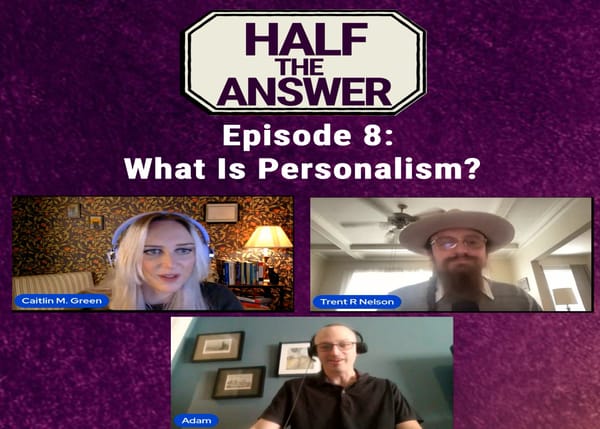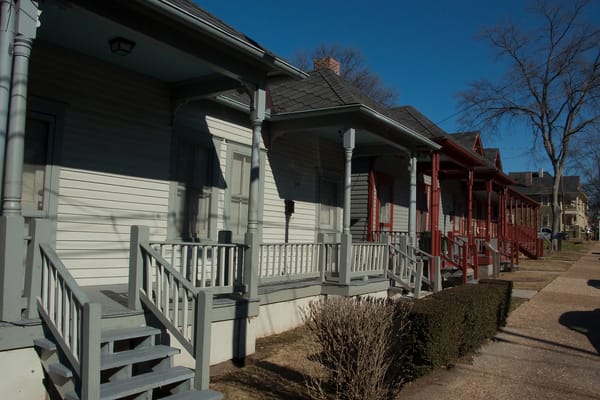Organization, Not Privacy, is the Foundation of Liberty

Civil libertarians assume that democracy relies on privacy. We cannot have autonomous citizens if privacy is not sacrosanct. Citizens require a protected space in which they can make up their minds, understand what they truly want and believe, free from outside influence or coercion.
The journalist Glenn Greenwald, who helped Edward Snowden reveal the National Security Agency’s vast surveillance operation in 2013, puts it thus:
Only when we believe that nobody is watching us do we feel free to truly test boundaries, to explore new ways of thinking and being, to explore what it means to be ourselves. For that reason, it is in the realm of privacy where creativity, dissent, and challenges to orthodoxy germinate.
Indeed, what are democratic citizens without creativity and dissent, the courage to push back against orthodoxy and autocracy alike? Meek, submissive citizens do not expand the bounds of liberty. Panoptic surveillance, as Michel Foucault famously described it, is a powerful tool of submission: when people are under watch, and know they are under watch, preferably from a power whose identity and will are uncertain, they will chasten themselves, watch what they do and say—free of physical coercion. Surveillance makes people their own oppressors, if you will; thus, Foucault says surveillance is eminently efficient.
It’s a compelling theory—but it’s wrong. Surveillance may not be so devastating and conformity-inducing as critics think. And privacy, the freedom from spying, coercing eyes, may not be the foundation of liberty. In fact, it is a rather incoherent notion, and certainly difficult to attain, from a practical point of view—especially in the digital age, when whatever privacy we might have enjoyed before is almost certainly doomed. Instead of doubling down on impossible goals, it is time we turned our focus on the foundation of political liberty—which is not privacy, but popular organization and coordination in the public realm.
A changing world
Many commentators and philosophers have pointed out how the digital economy achieves a form of panoptic surveillance more expansive and impressive than Foucault ever dreamed of. We are watched in everything we do by shadowy spies, who collect and analyze our every piece of data, and draw meticulous profiles on us. And yet, though we know we are watched online, we feel the need to share and blare intimate details galore. Seemingly nothing is beyond the pale, and standards of propriety or shame have gone out the window.
Civil libertarians bemoan how we make ourselves vulnerable in the process. The more Facebook knows about me, the more power it has to influence my decisions. If only we were unwatched, or keen on protecting our privacy, then we might also protect ourselves from external pressures. Except that the notion of privacy, this sacrosanct space wherein I am free, safe and pure, is fraught with problems. It seems impossible to arrive at an objective, universal concept of privacy. Whether we have privacy, or whether we feel ‘private,’ is largely up to each of us, and will vary according to our resilience and vulnerability.
Isaiah Berlin makes this clear when he likens it to an ‘area of non-interference’: what does it mean to be interfered with—or not? How shall I know when or if I am interfered with? And isn’t it up to me if I am or if I feel interfered with?
My mother grew up in a three-room cottage in the west of Ireland; her parents and 8 siblings shared the roughly 10 by 20 foot house. Contra Greenwald, quoted above, she is perfectly capable of making up her own mind, knowing what she wants, and ignoring what those around her—glaring perhaps—think of her. She is able to forge her own ‘privacy,’ if you will—never having been raised with the physical thing, which Greenwald insists is essential to personhood.
Autonomy is delivered not by being left alone to your own devices, in a safe, private space, where you can think what you want. Berlin notes that “fiery individualism” and independent-mindedness, the trademark of America’s enduring democracy, grows “at least as often in severely disciplined”—and oppressive—“societies, among, for example, the puritan Calvinists of Scotland or New England…” Individual autonomy has sources other than privacy.
In fact, it starts to emerge that privacy is an obstacle to liberty. For, not only is it incoherent, but also politically debilitating and disempowering. Privacy is championed and defended as an individual right. Consider major privacy regulations, proposed or enacted, like the European Union’s GDPR (General Data Protection Regulations), the envy of many civil libertarians. Said regulations generally seek to carve out more power for individuals to protect their data from hungry corporate spies. It is naïve and misguided, however, trying to empower lone individuals against the massive tech titans who spy on them. It’s not a fair fight. We can never grasp what information our spies want, how they get it, and what they will learn from it. Choices that the average individual would find trivial turn out to hold great interest. For example, one retailer has determined that a premiere indicator of credit worthiness is if people buy felt pads to protect their furniture. The notion, propagated by laws like GDPR, that we—individual citizens and consumers—can play some role in negotiating with our deep-pocketed spies about the data they want, what we will give them, and what they will deduce from it, is laughable. We can hardly fathom their esoteric science.
Privacy regulations lull us to sleep, thinking we are safe and secure, when that is far from the truth. What’s more, they urge us to protect ourselves as individuals, while we are more powerful as collectives—certainly, up against the likes of Apple and Google, and their armies of savvy data scientists.
Association and citizenship
“No man and no mind was ever emancipated merely by being left alone,” John Dewey affirms. According to Dewey, it is not individuals who are the proper foundation and fabric of democracy, but associations.These associations meet, convene, and sometimes conflict, in the public sphere.
Democratic citizens are social products. Which is to say, they are molded, formed, and empowered through social interaction, and they primarily exert power in collectives, not as individuals. Citizens are not magically produced on their own, in a private bubble. They are not made by simply giving people space, time, and quiet. They are just as likely to become preoccupied with egotistical concerns, and ignore the public good. Citizens are formed through interaction and communication, learned habits of negotiation and peaceful dispute, and the crucible of struggle.
Dewey understood ‘associations’ expansively. He included groups or entities that are explicitly political, such as advocacy groups, alongside those that are not, or not necessarily, such as social clubs, labor unions, churches, mosques, and synagogues. Dewey was also very concerned about the importance of schools in a democracy, and wrote extensively on the topic. Schools are a primary and essential forum where children are socialized, and learn to live with and communicate with people from many different backgrounds. Schools may serve as the polity in a microcosm, in other words.
Associations impart crucial democratic training for their members—they introduce them to democratic life—though the character of the groups themselves may not be democratic through and through. Often, they are not. They nurture democratic character nonetheless, because they provide members opportunities to learn how to listen to one another, navigate differences and disputes, and manage complicated coordination of efforts. Associations also instruct on how and when to mobilize, and in so doing, encourage individual citizens who would be less inclined and prepared to mobilize on their own. Associations help us define ourselves, address and compete with opponents, and challenge authority—credibly. Entrenched powers are more likely to heed, and perhaps fear, coordinated citizen action, not the demands of isolated individuals.
The Civil Rights movement offers an instructive case study of the power of associations, and the irrelevance of privacy. As individuals, civil rights activists were no match for Jim Crow; they were also subjected to constant surveillance, harassment, and worse. A typical example was the recently departed Bob Moses, who organized sharecroppers in Mississippi. He was persecuted for so much as mentioning the vote to unregistered African Americans, but he persisted nonetheless thanks to the solidarity of allies who flocked south during the Freedom Summer of 1964. And civil rights groups prepared and emboldened their activists, training them in various arts of non-violent protest. This was not something they could be expected to learn, much less practice on their own.
The proper solution to lost privacy is an abundance of public life. We must rediscover the joys and power of socialization, where we may build bonds with diverse others, in intentional groups such as Dewey eulogized. Associations mold, empower, and direct us as citizens. At the policy level, this means—concretely—that communities must integrate their built environment, and redesign it to elevate the public realm.
In a poignant statement, Dewey also wrote that “Democracy must begin at home, and home is the neighborly community.” Democracy is not a matter of abstract or ideal speculation, Dewey maintained. It is born in concrete action, mobilized in actual relations, grounded in the bonds you make with those who are proximate. Democracy withers when neighbors do not see one another, or interact on a regular basis. It withers when they fail to see what they have in common—or share a common purpose. Democracy is undermined when people feel so remote and isolated that they vilify one another. This is a pervasive result of social media echo chambers, which have made partisanship so rigid and unforgiving.
It also stems from our suburban isolation and atomization, where we are each consigned to our private pods, neatly divvied up and spaced apart. It is hard to conceive of a lived environment that better prioritizes privacy. In suburbia, we hardly need to see or know our neighbor, much less strangers passing by (few people sit on their front porches anymore—a vestige of the past). Suburbia frustrates the easy socialization that Dewey suggests is crucial to democratic life and energy.
There is no easy response to the problem of privacy. Regulations and technological fixes will not do the trick. We require nothing less than a renewed public realm, and a renewed commitment to making it the center of our communities, and daily life. Here we may once again witness the value of socialization, and feel the lure and power of associations. In the US, politicians inaugurate a billion-dollar plan to rebuild the infrastructure of our ports and roads; many angle for infrastructure fixes that promote sustainability and racial equity. We would be remiss to ignore the infrastructure of democracy.
Featured image is NAACP convention addressed by President Truman: 1947, by Scurlock Studios




